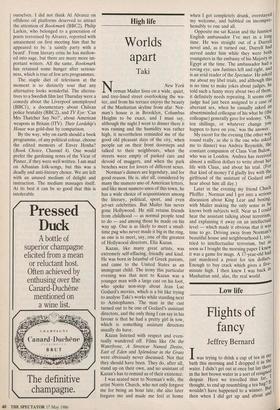High life
Worlds apart
Taki
Norman's dinners are legendary, and for good reason. He is, afer all, considered by many the numero uno of American letters, and like most numero unos of this town, he has a wide choice of acquaintances among the literary, political, sport, and even jet-set celebrities. But Mailer has never gone Hollywood. He still retains friends from childhood β as normal people tend to do β and among those he made on his way up. One is as likely to meet a small- time pug who never made it big in the ring, as one is to meet, say, one of the greatest of Hollywood directors, Elia Kazan.
Kazan, like many great artists, was extremely self-effacing, friendly and kind. He was born in Istanbul of Greek parents, and came to the United States as an immigrant child. The irony this particular evening was that next to Kazan was a younger man with a large cast on his foot, who spoke non-stop about Jean Luc Godard's movies, which is a bit like trying to analyse Taki's works while standing next to Aristophanes. The man in the cast turned out to be one of Godard's assistant directors, and the only thing I can say in his favour is that he had a pretty girl in tow, which is something assistant directors usually do have.
Kazan listened with respect and even- tually wandered off. Films like On the Waterfront, A Streetcar Named Desire, East of Eden and Splendour in the Grass were obviously never discussed. Not that they should have been. They do, after all, stand up on their own, and no assistant of Kazan's has to remind us of their existence.
I was seated next to Norman's wife, the artist Norris Church, who not only forgave me for being an hour late, she also later forgave me and made me feel at home when I got completely drunk, overstayed my welcome, and babbled on incompre- hensibly to one and all. Opposite me sat Kazan and the funniest English ambassador I've met in a long time. He was straight out of a Durrell novel and, as it turned out, Durrell had served under him while they were both youngsters in the embassy of his Majesty in Egypt at the time. The ambassador had a roving eye, saw Justines left and right, and is an avid reader of the Spectator. He asked me about my libel trials, and although this is no time to make jokes about judges, he told such a funny story about two of them, it definitely needs repeating. It seems one judge had just been assigned to a case of aberrant sex, when he casually asked an absentminded colleague of his what he (the colleague) generally gave for sodomy. 'Oh, ten shillings, or whatever change you happen to have on you,' was the answer. My escort for the evening (the other way round really, as she is the one who asked me to dinner) was Andrea Reynolds, the constant companion of Claus Von BuloW, who was in London. Andrea has received almost a million dollars to write about her life with Claus, and about his trial. (For that kind of money I'd gladly live with the girlfriend of the assistant of Godard and hear about him all day.) Later in the evening my friend Chuck Pfeiffer , Norman and I got into a serious discussion about King Lear and boxing, with Mailer making the only sense as he knows both subjects well. Near us I could hear the assistant talking about terrorism, and explaining it away on an intellectual level β which made it obvious that it was time to go. Driving away from Norman's beautiful house and neighbourhood I, toΒ°, tried to intellectualise terrorism, but as soon as I bought the morning paper I knew it was a game for mugs. A 17-year-old had just murdered a priest for ten dollars. Enough to buy crack which gives a five minute high. I then knew I was back to Manhattan and, alas, the real world.


















































 Previous page
Previous page